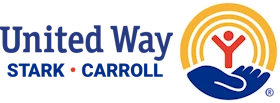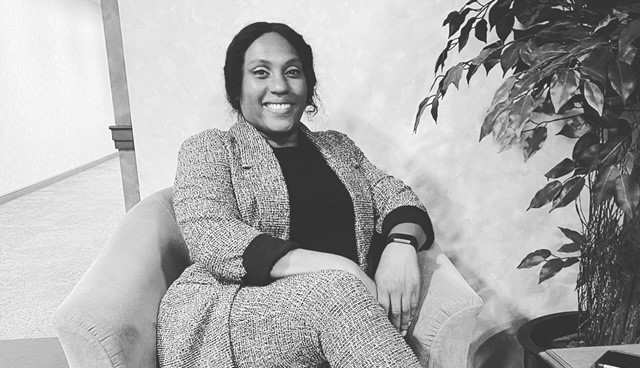“I was actually unfamiliar with Project Blueprint until a previous graduate reached out and shared their experience of the training with me,” said Tiffany “TK” Kinnard-Payton, recent graduate of Project Blueprint and Dean of Students at Walsh University. “She said it could be something beneficial to what I am doing professionally. Originally, I wasn’t going to be able to participate, but when the classes were rescheduled because of the pandemic, my life had transitioned, and I was definitely able and interested in the training.”
Project Blueprint is designed to train more volunteer leaders of color (African Americans, Asians, Hispanics, Native Americans, and other racial minorities) to have a greater voice in the community by having more opportunities with boards and committees. It provides participants with the knowledge to serve effectively through gaining new skills, experiences, and the confidence essential to these roles.
“I had just taken on a Chair role on our University Senate but had no in-depth experience with the nuances of committees and only a little bit of previous experience working with university student government.”
Hands-on training introduced the class to the roles and responsibilities of nonprofit boards and committees, which included session topics such as economics, boardsmanship, Roberts Rules, financial management, strategic planning, and agency spotlights.
“So much of what I learned during Project Blueprint is valuable to my work-life, as well as my personal life. Being able to network and meet new people, particularly professionals of color in different fields other than mine, especially in higher education, was extremely valuable. It was so nice to be able to step outside of my world, meet new folks, find out what they’re doing, and how it connects to my job field. The training provided a lot of valuable information that was very mind-blowing, things I have never thought about. “
Project Blueprint helps participants understand the impact of being on a board or committee, creates a safe space of opportunity for networking and offers a chance for personal and professional growth.
“This training presented an opportunity for me to learn committee procedures but also helped me implement what I learned with students I am currently working with as a student government advisor. The training was very timely. It’s changed how we will work with our students. This year’s Walsh Student Government training will start with a retreat with our student government executive officers. During those days, I will share many of the practices I learned in Project Blueprint training. Also, the executive board members will visit our president’s home where he will speak to them about the importance of executive leadership. Understanding the mission and vision for the organization that you’re going to be representing is so critical. It is equally important to learn how to be a good role model. With board service, you must have a passion to do the work. You don’t just show up, sit, and take up space. It’s not just about you. You’re in the seat and doing the work. The work isn’t about you because you represent the different constituencies on campus and these students take that role very seriously. This group is taking it to the next level.”
Project Blueprint sessions are taught by local leaders who provide valuable insight from the perspective of organizational or board leadership. The program participants also learn about the strengths and challenges in Stark County from those in the community who are committed to making a difference through their work.
“Even if you have no intention of being on a board committee, just for the sheer knowledge of understanding what is impacting your community, you should invest in this program. I’ve had some conversations with my family members, and they were opportunities for me to be a change agent. I was able to share how things work on committees and why they go through the processes that they do. People need to be able to see themselves in a program. It makes them curious. When they get involved, they see that it’s just regular people on committees and boards, people with a heart for their community and a passion. Because the reality is everybody has something to offer. It doesn’t have to be education or profession; it can be lived experience. Lived experience is just as important as education and professional.”
Project Blueprint helps participants figure out what kind of board they are interested in and who they want to be connected to in order to create positive change.
“The training also gave me confidence. Quite frankly, most of the boards I saw had people that did not look like me, and this made me hesitant to explore volunteering.”
“My experience had been even the people that look like me, had a status that I didn’t think was attainable, said LaFlovia “Flo” Ginanni, United Way of Greater Stark County’s Director of Project Blueprint. “They have name recognition and status – I could never be that. But, once I started putting myself out there, I found out my perceptions were not the truth. I am still very shocked that professionals want me on their committees though. Honestly, it’s a real paradigm shift in culture.”
One of the workshop’s goals is to create intentional social progress through better representation of the community in volunteer leadership on boards and committees.
“The institution I work for is a predominantly white institution, so it is still weird to me when people ask me to be on committees, says TK. “I am a little bit uncomfortable because I’m just so used to kind of flying under the radar. I don’t know that I’ll ever get used to it; it’s been a few years and I still struggle. But now, with what I have learned with Project Blueprint, it is my goal to spread the word that it’s not just about filling those board positions, but also changing the mindset of people who need to be on those boards. Yes, this is attainable for you. Yes, you belong in those places. Yes, you have something to add. Yes, you are valuable to your community.”
Each session of Blueprint offers a chance for more people of color to have a seat at the tables of organizations that shape our community.
“People of color sell themselves short,” says TK. “We have been in the workplace many years, see a ceiling and internalize the process that we are not good enough to break through that ceiling. I think that’s why I’m so excited about the college version of Project Blueprint that Walsh University is launching with United Way in October. We start working with young adults before they are entrenched in workplace bias. They have hope and energy and we give them the tools to have the confidence to say yes to more community involvement and be instruments of change. We are excited to prepare young adults for the future, teaching them volunteer leadership skills now – so they don’t have to play catch-up later. I don’t want anyone running and trying to hand the baton back. Let’s run together.”
“One of my goals is to be a good mentor to someone. We have to start thinking ahead and creating sustainability for people of color on boards and committees. Young people are interested in creating a better future; we just need to put in the time and effort needed to help them succeed. They need people who are willing, committed, and invested in wanting to see change in our community-people who can pass down skills and raise people up who can take on obligations and volunteer leadership roles.”
“One of the things my mentor helped me understand was the things that go unsaid. There are things that impact us in our professional lives that our people don’t talk about. And one of the nuances of being in professional positions is that you must watch what’s said and read into what’s not said – consciously building strategic and intentional connections and relationships. Networking with a purpose. Project Blueprint reinforced that insight. Depth of relationships is really what makes for bigger investments in the future. Invest in your social capital. “
More information on the upcoming fall session can be found at uwstark.org/project-blueprint

